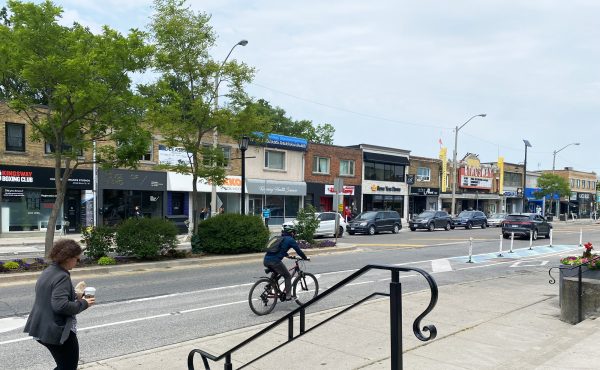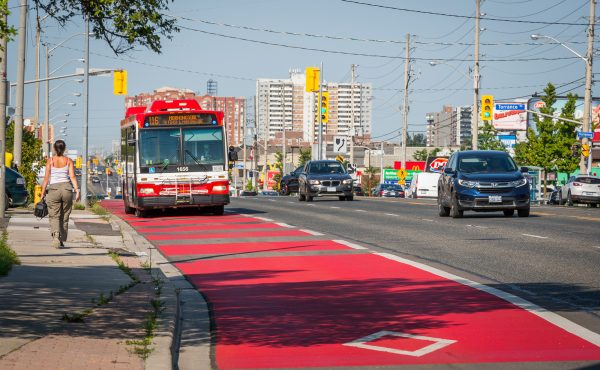
A strike in France seems like a contagious thing: with the rail services across the country going on strike recently, a number of other groups are walking out including public transit workers, actors, university students, and the state-run electricity company. The latter group even said they would cut power at the political offices of France’s president as well as planning “Robin Hood operations — restoring power to households that cannot afford their electricity bills,” according to the Toronto Star. North American unions seem like Boy Scouts in comparison.
But what caught my eye was a little blurb about Paris’s new city-run bike rental operation: it seems people are scooping them up to get around town. I believe the bike rental system is funded by outdoor advertising on city-owned street furniture. It is believed the City of Toronto plans to run a similar program based on a similar funding model.
From yesterday’s Star:
With Paris transit workers set to join in, the capital’s public transit authority RATP predicted there would be almost no trains on most subway routes starting Wednesday. Only one line — the north-south line 14 — was expected to run normally because it is automated.
Parisians were firming up contingency plans. Accountant Xavier Basset was preparing for a six-kilometre walk across Paris to his office.
“I’ll work on my calves,” he said.
Other Parisians will likely share cars, stay home or rent one of the more than 10,000 bikes recently installed around the capital. They proved extremely popular during another transit strike last month, when the number of daily users doubled to 180,000.
Organizers said they plan to dispatch 260 workers armed with metal cutters to snip the padlocks of people who may try to hog the bikes all day. The bikes are designed to be used for short trips, as rental prices skyrocket as the clock ticks — which is usually enough to deter riders from hoarding the bikes, although not on strike days.
Motorcycle taxis, able to weave through snarled traffic, also looked like a good solution. Managers for two motorcycle taxi services said they were completely booked through early Friday.
photo by Evan Austin




17 comments
Souvent, les velos sont meiulleuers, oui?
As for our suffocated Bikeshare program, maybe there weren’t enough ads on it for acceptibility. And if $ were the problem, I wonder where the interest on the $50M that is set aside for the Front St. Extension goes to? Who controls it? Does it fund the TWRC offices?
Oops, c’est meilleur – typos sont universel.
There is a very similar bike program in Vienna and other cities. It is fantastic and heavily used.
I’m not convinced a new, larger bikeshare program is the best way to encourage cycling. Why not focus on more bike lanes, larger bike racks at key locations, and more bike safety training?
I think an ad-supported bike network in TO will be too small and poorly run to generate the network effects necessary to make it a success. I think it will detract energy from efforts to make this a truly bike-friendly city.
That said, I’m eager to be proven wrong. Hope it turns out to be a success.
Seems like every other city is doing it (or looking at it) – Toronto can too!
Ah, yet another attempt by Toronto to import a European biking system to North America…
I suspect these type of bike rentals are best for tourists and that some kind of BikeShare will emerge. The two can co-exists, as BikeShare was much more grassroots oriented program wheras the Paris -ad-funded model is more oriented for the up-scale crowd.
I agree with Fin. Bikeshare programs are fine, go ahead if you can get some street furniture company to fund it. But it is a drop in the bucket, cute for tourism and a small number of users but of little value to the mass of bike users. In a time when bikes cost less than a nice pair of jeans there really is no problem with bike ownership and bike parking at home is much better in modern Toronto than in, say, cramped Manhattan. Bike parking at work is an issue but one that can be solved incrementally. The key is the network of bike lanes that actually make going somewhere possible in the first place.
This is an inspiring example.
But I also agree that I’d rather see more bike lane and bike routes installed in Toronto before free bike programs.
If you don’t have those safe, reliable routes first, biking can seem like a very unsafe, very untenable option for many commuters, no matter how many free bikes you provide — and no matter how much more it might cost to drive in rather than bike in during a transit strike.
I’d also be interested in seeing low-cost bikes provided in some way to all who can’t afford new ones, or economical repair services, at least before bikes for all are implemented (I say this because I think free bike programs would likely be initiated in gentrified areas too promote the whole tourism/cultural city schtick before they’d be put by the city in more high-risk communities.)
Paris does have more by way of bike lanes than Toronto. That said, a number of those lanes, especially in the centre of the city, are shared with buses and taxis. The taxis are alright, but sharing the lanes with buses is, well, absolutely terrifying.
But I also agree that I’d rather see more bike lane and bike routes installed in Toronto before free bike programs.
They’re not free bikes, and there’s absolutely no reason why one has to come before the other. We can walk and chew gum at the same time on this one. I have to think that having more people riding more bikes — even if they’re icky tourists and not noble bike-needers — can only add to pressure for better biking infrastructure.
Autocar and Zipcar are good analogies, to a point. To borrow one you have to have signed up and paid a small fee. Then you borrow by swiping your credit card at the bike rental. The first 30 minutes are free. Subsequent time is tariffed. Here’s a whole rundown.
Motorcycle taxis! I want to know more about those. That could be a great idea for reducing the amount of space (and, if the vehicles are modern, gas consumption and emissions) taken up by vehicles on the roads. Why have a whole car to move two people around when you could do it by motorbike? But I’m wondering how they actually work. Anyone have experience of them?
I used motorcycle taxis all the time in Vietnam. They were simply a network of motorcycle owners who stood on the corner and called out “moto-bike?” when you walked past. The price was usually negotiated before you got on.
I would be very surprised if the government allowed this in Canada. I have the suspicion that concerns over liability, licensing, bureaucracy, safety, and all the other things that make life boring will keep it that way.
The fastest way to get around Toronto is by bicycle.
The JC Decaux contract in Dublin is dependent on advertising, mostly on new sites. Some of the locations applied for are very contentious with the Planning Appeal Board (An Bord Pleanala) handling the appeals in bulk which has caused much bad feeling. There is also a view that the French cities who have similar deals with the same company got far better deals in bikes/billboard terms.
As for a similar scheme in Toronto – is there anywhere left to sell to a private firm that (a) hasn’t been sold to Astral for 20 years or (b) would open the city to a charge of breach of contract by Astral?
Re. Shaun on motorcycle taxis – that’s what interests me about their presence in Paris – since France is pretty highly regulated but they exist there, it suggests that they could be possible here in Canada too.
Sorry Disparishun, I still disagree. If you’ve ever worked for (or with) the government, you know that like any organization, they have limited time and resources. There are only so many things they can focus on at one time. If a city bike rental scheme moves to the top of the agenda, there will be a lot of public consultation, debate, and planning to do, and I think it will detract from the already slow and difficult process of building a bike network throughout Toronto.
You make a good point about the scheme adding pressure for a better network in the core, though.
A late comment – I was in Paris during part 1 of the transit strike 3 weeks ago. There was barely a bike left to be had anywhere; people were really relying on them As for comments that this is probably best for tourists, I spent much of 2 weeks observing how people were using the system and it appeared to me that it was mostly locals… though it’s hard to tell sometime who’s who. I couldn’t even get it to work as it didn’t recognize my foreign credit cards.
The bikes are ad-funded, but in 2 weeks I didn’t see a single bike sporting a commercial ad of any kind – aside from a very unobtrusive JCDecaux logo embossed on part of the frame. The only markings on the bikes were for the City government.
I’m also not sure about the “upscale” targeting of the bikes. Certainly, you need either a credit card or a rechargeable transit card to borrow one, but the first half hour is free, and the second half hour costs one Euro. I would not be surprised if the poorest Parisians were not participating in the system in great numbers… I am not sure if users who pay with a transit card have to pay a deposit. On your credit card, they pre-authorize, without charging, 150 EUR in case you don’t bring it back.
All in all, the system looked pretty great to me. I’m no fan of ad-company-provided amenities, but it seems to me as if Paris used its muscle to get a well-designed system and it would be wonderful if Canadian cities followed suit.